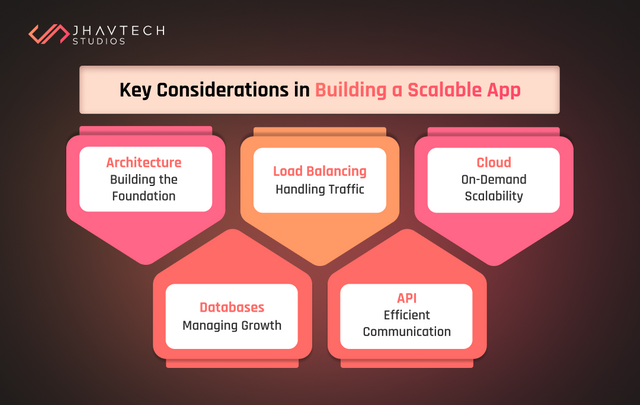App Development for Scalability: Future-Proof Your Business
In today’s rapidly evolving digital landscape, simply having an app is no longer enough for businesses looking to thrive. They need apps that can scale seamlessly, handle growing user demands, and adapt to new technologies without performance hiccups. This is where scalable app development comes into play. By focusing on scalability, businesses ensure that their applications are equipped to support their future growth and evolving customer needs.
But what exactly does it mean for an app to be scalable? And why is this concept so critical to the long-term success of your business? In this article, we'll delve into the principles of scalable application development, why it's crucial for future-proofing your business, and how you can apply certain strategies to build an app that grows with your company.
What Is Scalability in App Development?
Scalability in app development refers to an application’s ability to handle increased load—whether that’s a higher number of users, more data, or additional features—without compromising performance. In other words, as your business and user base grow, a scalable app should continue to run smoothly without crashing or slowing down.
Imagine an app that performs perfectly with 100 users but begins to lag or crash when it hits 1,000 users. That’s an app that wasn’t designed for scalability. A scalable app, on the other hand, would be able to manage this influx of users seamlessly, ensuring that the user experience remains smooth and consistent no matter how many people are using the app at the same time.
Why Is App Scalability Crucial for Business Success?
Scalability isn’t just a technical requirement—it’s a critical factor for business success. As your company grows, so too will the demands placed on your app. If your app development process doesn’t account for scalability, it will negatively impact user experience, customer satisfaction, and ultimately, your bottom line.
Consider this: A recent study revealed that 53% of mobile users abandon an app if it takes longer than three seconds to load. If your app isn’t built to scale, it may struggle with performance issues as user traffic increases, leading to longer load times and a frustrating experience for end users. This can result in users abandoning your app for a competitor’s, especially in today’s fast-paced digital environment.
Moreover, scalable apps allow businesses to innovate freely. Whether you're launching a marketing campaign, rolling out a new feature, or expanding into new markets, a scalable app can handle increased traffic without buckling under pressure. This flexibility allows you to focus on growth, knowing that your app development venture has laid a solid foundation to support your business’s evolving needs.
Key Considerations in Building a Scalable App
To future-proof your app for growth, scalability must be a top priority from the very start. Below are key considerations when building a scalable app.
1. Architecture Design: Laying the Right Foundation
The architecture of your app is its backbone, determining how easily it can scale. Choosing the right architecture is critical. A microservices architecture, for example, breaks down an app into smaller, independent services that can be scaled individually. This modular approach allows for more flexibility, as each service can be updated or expanded without affecting the entire system.
In contrast, monolithic architectures can be more challenging to scale. If one part of the system fails or slows down, it can bring the whole app to a standstill. As a result, opting for a modular, scalable architecture like microservices ensures your app development aligns with business growth, adapting to changing needs without bottlenecks.
2. Load Balancing: Managing User Traffic
When your app experiences a surge in users, load balancing helps distribute this traffic across multiple servers. This prevents any one server from becoming overwhelmed, ensuring that your app remains responsive and functional even during peak usage times.
A great real-life example is Spotify, which regularly experiences spikes in traffic when new music is released. Load balancing ensures that all users can stream their favorite songs without interruption, regardless of traffic levels.
3. Cloud Infrastructure: Scalability on Demand
Cloud computing services like Amazon Web Services (AWS), Google Cloud, and Microsoft Azure offer flexible, scalable infrastructure. With cloud platforms, you can adjust your app’s resources on the fly, scaling up during high-demand periods and scaling down when traffic subsides.
Cloud infrastructure also allows you to pay-as-you-go, making scalability cost-effective. Instead of investing heavily in physical servers that may not always be needed, you can use cloud resources that grow or shrink as needed, keeping operational costs manageable.
4. Scalable Databases: Managing Growing Data Loads
As your app grows, so does the volume of data it handles. A scalable database is essential to ensure your app can process and store large amounts of data without slowing down. Techniques like database sharding —where large databases are broken down into smaller, more manageable pieces—can significantly enhance performance as your user base expands.
For example, Facebook uses database sharding to ensure that their massive data is distributed across various servers, allowing millions of users to access and interact with content in real-time without lag. Scalable databases are a critical component of app development, ensuring that your app can grow without sacrificing performance.
5. API Management: Ensuring Efficient Communication
APIs (Application Programming Interfaces) are essential for connecting different services in an app, and efficient API management is critical for scalability. As your app grows, more users and services will rely on these APIs, which can create bottlenecks if not managed properly.
By optimizing your API strategy with techniques like rate limiting and caching, you can ensure that your app’s services scale smoothly and maintain high performance, even as demand increases.
Testing for Scalability
No matter how well-designed or feature-rich your app may be, thorough testing is essential to ensure that it can scale effectively as usage increases. Scalability testing helps to identify potential bottlenecks, optimize performance, and maintain exceptional user experience when your app is subjected to varying loads, whether from increasing numbers of users, data, or transactions. By testing for scalability early on, you can prevent unexpected crashes, slowdowns, and performance issues that could negatively impact user satisfaction and business success.
1. Load Testing
Load testing simulates real-world traffic scenarios to see how your app performs under pressure. By conducting regular load tests, you can identify performance bottlenecks and ensure that your app can handle increased traffic without failing.
For instance, Netflix routinely performs load testing to simulate high-demand situations, ensuring that its streaming service performs optimally even during the busiest times, like when a new show is released.
2. Automation Testing
Automation testing speeds up the testing process and ensures that your app performs well across various devices and operating systems. By automating these tests, you can continuously monitor your app’s performance as it scales, ensuring it remains efficient as you introduce new features or see an uptick in users.
The Costs of Ignoring Scalability
Overlooking scalability during app development can have significant financial and reputational costs. An app that can’t handle increased demand may experience crashes, long load times, or data processing delays, all of which can frustrate users. This often leads to customer churn, with users abandoning your app for more reliable alternatives.
Moreover, retrofitting scalability into an existing app is costly and time-consuming. For instance, after Instagram was acquired by Facebook, it had to undergo extensive updates to scale its infrastructure to handle the sudden influx of millions of new users. If scalability had been prioritized during the initial app development process, Instagram could have avoided these challenges.
Futureproofing for Emerging Technologies
Building a scalable app isn't just about handling more users—it’s about being adaptable to future technological advancements. Whether it’s AI, machine learning, or IoT (Internet of Things), future-proofing your app ensures it can easily integrate emerging technologies.
Take Tesla, for instance. The scalability of its app allows for seamless software updates, ensuring that drivers can take advantage of new features like self-driving capabilities without needing to upgrade their vehicles physically.
Optimizing Performance for Scalability
1. Code Optimization
Efficient, clean code is the foundation of a scalable app. Bloated, inefficient code can slow down performance as more users or features are added. Regularly reviewing and refactoring your code is crucial for keeping your app scalable.
2. Caching
Caching frequently accessed data reduces the strain on your servers and improves response times. For example, caching ensures that users experience faster load times, which is essential for delivering a smooth user experience as your app scales.
Conclusion: The Key to Long-Term Success
Scalable app development is not just about ensuring technical performance—it’s about future-proofing your business for growth. By focusing on scalability, you ensure that your app can handle increased user traffic, adapt to new technologies, and meet your evolving business needs without breaking a sweat.
From choosing the right architecture to leveraging cloud infrastructure, load balancing, and optimizing your code, scalable app development sets the stage for long-term success. Whether you're a startup gearing up for rapid growth or an established business expanding into new markets, scalability is key to ensuring your app remains competitive and robust.
Investing in scalable app development today will save you time, money, and headaches tomorrow. By building a future-proof app, your business can thrive in an ever-changing digital world.
.png)
.png)